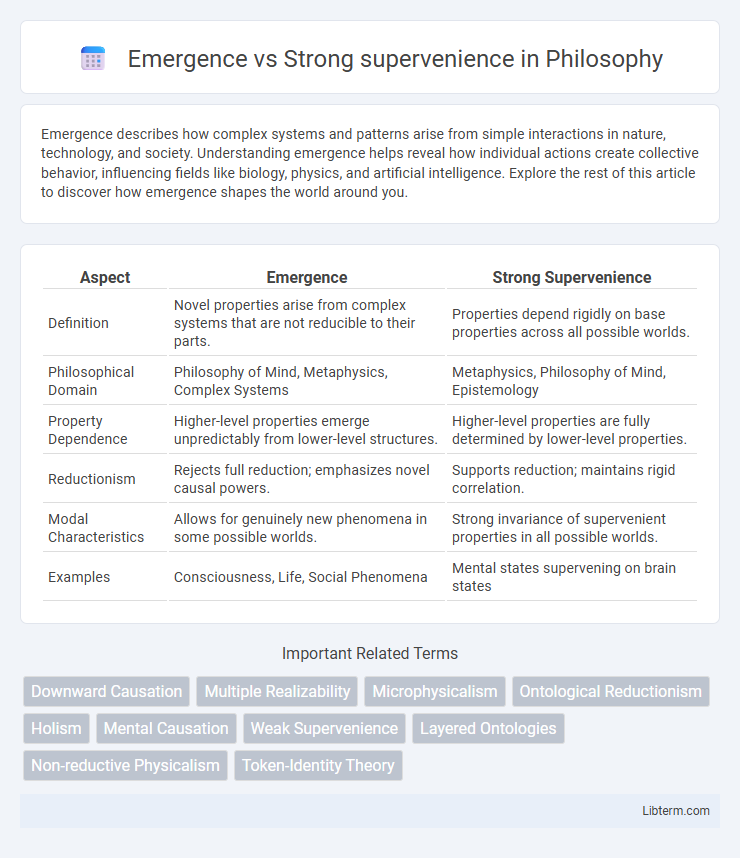Emergence describes how complex systems and patterns arise from simple interactions in nature, technology, and society. Understanding emergence helps reveal how individual actions create collective behavior, influencing fields like biology, physics, and artificial intelligence. Explore the rest of this article to discover how emergence shapes the world around you.
Table of Comparison
| Aspect | Emergence | Strong Supervenience |
|---|---|---|
| Definition | Novel properties arise from complex systems that are not reducible to their parts. | Properties depend rigidly on base properties across all possible worlds. |
| Philosophical Domain | Philosophy of Mind, Metaphysics, Complex Systems | Metaphysics, Philosophy of Mind, Epistemology |
| Property Dependence | Higher-level properties emerge unpredictably from lower-level structures. | Higher-level properties are fully determined by lower-level properties. |
| Reductionism | Rejects full reduction; emphasizes novel causal powers. | Supports reduction; maintains rigid correlation. |
| Modal Characteristics | Allows for genuinely new phenomena in some possible worlds. | Strong invariance of supervenient properties in all possible worlds. |
| Examples | Consciousness, Life, Social Phenomena | Mental states supervening on brain states |
Defining Emergence: Core Concepts
Emergence refers to the phenomenon where complex systems exhibit properties or behaviors that are not predictable solely from the understanding of their individual components. Strong supervenience implies that higher-level properties depend deterministically on lower-level bases without any novel causal powers emerging. Defining emergence centers on identifying core concepts such as novelty, irreducibility, and the failure of strong supervenience to fully capture the independence of emergent properties.
Understanding Strong Supervenience
Strong supervenience describes a relationship where the properties of one set (often mental or emergent) depend rigidly on another set (usually physical properties) such that any change in the dependent properties necessitates a corresponding change in the base properties. This concept is crucial in philosophy of mind and metaphysics, emphasizing that no variation in supervenient properties can occur without variation in subvenient properties, thus reinforcing a non-reductive dependency. Unlike emergence, which implies novel, irreducible phenomena arising from simpler constituents, strong supervenience stresses strict dependency without necessarily implying new ontological categories.
Historical Roots of the Debate
The historical roots of the debate between emergence and strong supervenience trace back to early 20th-century philosophy of mind and metaphysics, particularly discussions on the relationship between mental states and physical states. Philosophers like C.D. Broad and Samuel Alexander introduced emergentism, emphasizing novel properties arising from complex systems that are not reducible to their parts. In contrast, strong supervenience, formalized later by Donald Davidson and Jaegwon Kim, asserts that higher-level properties depend rigidly on lower-level physical properties, framing the discourse on reductionism and non-reductive physicalism.
Key Philosophical Distinctions
Emergence describes novel properties arising from complex systems that are not reducible to their constituent parts, whereas strong supervenience asserts that higher-level properties depend rigidly and systematically on lower-level bases without novel causal powers. Key philosophical distinctions center on whether emergent properties possess causal efficacy beyond physical substrates, challenging reductive physicalism, while strong supervenience maintains a non-emergent, dependent relationship ensuring no ontological novelty. This distinction impacts debates on the nature of consciousness, laws of nature, and the metaphysical grounding of properties.
Examples of Emergence in Science
Emergence in science is exemplified by phenomena like consciousness arising from neural activity, where macroscopic mental states cannot be fully predicted by studying individual neurons alone. Weather patterns such as hurricanes demonstrate emergent properties, as complex atmospheric interactions produce organized behavior beyond simple component analysis. Strong supervenience contrasts by insisting that changes in higher-level properties necessitate corresponding changes in lower-level physical states, highlighting a strict dependency not always evident in emergent phenomena.
Cases Illustrating Strong Supervenience
Strong supervenience occurs when any change in a higher-level property necessarily implies a change in the underlying base properties across all possible worlds, illustrating a strict dependency. Cases illustrating strong supervenience include mental states supervening on brain states, where identical brain configurations guarantee identical mental experiences globally. These examples highlight the rigid correlation between microphysical bases and macro-level properties, emphasizing non-variability in the higher-level phenomena given fixed lower-level conditions.
Comparing Causal Relationships
Emergence describes phenomena where higher-level properties arise from but cannot be fully predicted by lower-level causal interactions, exhibiting novel causal powers distinct from their components. Strong supervenience implies that any change in higher-level properties necessitates a change in underlying lower-level states, indicating a fixed causal dependency without introducing new causal powers. Comparing causal relationships, emergence emphasizes novel, irreducible causal effects at higher levels, whereas strong supervenience stresses a rigid causation strictly determined by lower-level properties.
Implications for Mind-Body Philosophy
Emergence implies that higher-level mental states arise from but are not reducible to physical brain processes, suggesting novel properties that challenge reductionist views in mind-body philosophy. Strong supervenience asserts a strict dependence of mental properties on physical states, reinforcing a non-reductive physicalism where mental differences necessarily indicate physical differences. The debate impacts theories of consciousness, with emergence supporting ontological novelty and strong supervenience emphasizing dependency without allowing causal autonomy to mental properties.
Critiques and Counterarguments
Critiques of emergence highlight its vague definitions and the risk of explaining phenomena through ill-defined or overly broad concepts, while strong supervenience faces challenges regarding its explanation of dependence without explicating causal or constitutive relations. Counterarguments emphasize that strong supervenience may be too rigid to account for genuinely novel emergent properties that exhibit irreducibility or downward causation. Debates often center on whether emergent phenomena can be fully captured by underlying base properties or necessitate a distinct ontological status beyond supervenience frameworks.
Future Directions in Metaphysical Research
Emergence challenges strong supervenience by suggesting that novel properties arise in complex systems that cannot be fully reduced to or predicted from their base-level constituents. Future metaphysical research aims to refine the criteria distinguishing weak from strong supervenience, emphasizing the role of causal powers and explanatory gaps. Investigations into the integration of emergent phenomena with physicalist frameworks will further illuminate the ontology of higher-level properties and their dependency relations.
Emergence Infographic

 libterm.com
libterm.com